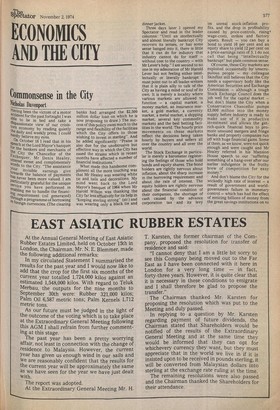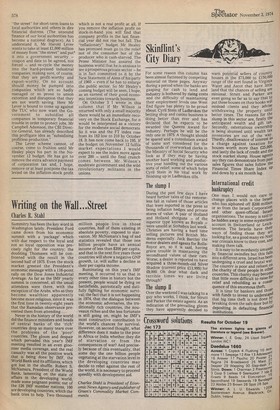Commonsense in the City
Words to the City. "The assistance towards the balance of payments has never been more valued. 1 am uttered sweet and complimentary Particularly grateful for the unique the daily and weekly press. I could hardly believe my eyes. speech at the Lord Mayor's banquet for the bankers and merchants of the City the Chancellor of the Exchequer, Mr Denis Healey, Your invisible earnings give service you have performed in .enabling me to handle the financdispassionate view of our crisistorn economy by reading quietly Having been the victom of a motor accident for the past fortnight I was able to lie in bed and takea
On October 18 I read that in his • • requirement (oil generated) !orough a programme of borrowing In foreign currencies. (The clearing
Nicholas Davenport
banks had arranged the 82,5040 million dollar loan on which he is now proposing to draw.) The success of this policy owes much to the range and flexibility of the facilities which the City offers to those wishing to invest in sterling". And he added significantly "Praise is also due for the unobtrusive but effective way in which the City has eased the strains which in recent months have affected a number of financial institutions."
What made this handsome compliment all the more touching was that Mr Healey was wearing white tie and tails and decorations. My mind went back to the Lord Mayor's banquet of 1964 when Mr Harold Wilson was thanking the City far less effusively for its help in "keeping sterling strong" (sic. ) and was wearing only a black tie and
dinner jacket.
Three days later I opened my Spectator and read in the leader columns: "Until an intellectually and almost literally bankrupt City recovers its senses, or has some sense banged into it, there is little that it can do for industry that industry cannot do for itself — without cost to the country — with Mr Lever's help." I am second to no one in my admiration of Mr Harold Lever but not feeling either intellectually or literally bankrupt I must point out to all leader-writers that it is plain silly to talk of the City as having a mind or soul of its own. It is merely a locality where various markets are allowed to function — a capital market, a money market, an insurance market, a gold market, a currency market, a metal market, a shipping market, several key commodity markets and the best betting facilities in the world. The hourly price movements on these markets reflect the decisions being taken hourly by buyers and sellers all over the country and all over the world.
The Stock Exchange in particular is merely a barometer registering the feelings of those who hold bonds and equity shares. The bond holders are rightly nervous about inflation, about the sharp increase in the borrowing requirement and about the rate of interest. The equity holders are rightly nervous about the financial condition of their companies, the shortage of cash caused by the advance corporation tax and its levy
on unreal stock-inflation profits, and the drop in profitability caused by price-controls, rising4 wage-costs, strikes and factory upsets. Result — you can buy a bond to yield 16 per cent and an equity share to yield 12 per cent on a price-earnings ratio of 3. I do not call that being "intellectually bankrupt" but plain common sense.
Of course, these City markets are exploited occasionally by unscrupulous people — my colleague Skinflint still believes that the City needs a supervisory body like the American Securities and Exchange Commission — although a tough Stock Exchange Council does the job well for the capital market — but don't blame the City when a Conservative Chancellor pumps £3,000 million into the money supply before industry is ready to make use of it in productive investment and allows the getrich-quick financial boys to promote unsound mergers and fringe banks and property companies run off with huge financial gains. Some of them, as we know, were not quick enough and were caught and Mr Healey referred in his Mansion House speech to our "suffering something of a hang-over after our earlier indulgence in the frothy brew of competition for easy money."
And don't blame the City for the wickedly high rate of interest — a result of government and worldgovernment failure in monetary control — which has had the effect of enticing billions of money from the great savings institutions on to
"the street" for short-term loans to local authorities and others in dire financial distress. (The unsound finance of our local authorities has become a national disgrace). As I understand it, Mr Harold Lever wants to take at least £1,000 million of money from "the street" and put' it into a government security — coupon and date to be agreed, not forced — and re-cycle the money into the hard-pressed industrial companies, making sure, of course, that they are profit-worthy and export-worthy. On no account should money be pumped into companies which are so badly managed or so prone to union extortion and disruption that they are not worth saving. Here Mr Lever is bound to come up against the TUC who now want the Government to subsidise all companies in temporary financial trouble in order to protect jobs. Mr Campbell Adamson, the CBI Director-General, has already described this profligate idea as "subsidising profitless production."
The Lever scheme cannot, of course, come to fruition until Mr Healey plays his part in the November 12 budget. He has got to remove the extra advance payment of corporation tax and, I hope, remove or at least postpone the tax levied on the inflation-stock profit which is not a real profit at all. If you remove the inflation profit on stock-in-hand you will find that company profits in the last financial year did not rise but fall. The "reflationary" budget Mr Healey has promised must go to the relief not of the consumer but of the producer who is cash-starved. The Prime Minister has assured the business world that he is anxious to see a prosperous private sector — he is in fact committed to it by the New Statement of Aims of his party of 1960 — even if he has to enlarge the public sector. So Mr Healey's coming budget will be seen, I hope, as an earnest of their good economic intentions towards business.
On October 5 I wrote in this column that if Mr Wilson is returned with only a small majority there would be an immediate recovery on the Stock Exchange, for it would be interpreted as a victory for the moderate social democrats. So it was and the FT index rose from its 182 low to 210 by October 18. It has now come back to 195. If the budget on November 12 fulfils market expectations I would expect to see the index move again over 200 — until the final crunch comes between Mr Wilson's moderate government and the wild revolutionary militants in the unions.



































 Previous page
Previous page